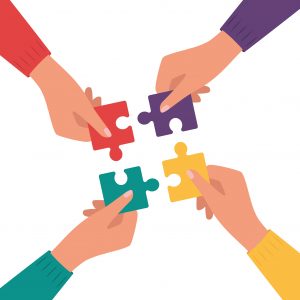
Welcome to my space for the reflections on topic 2 – Open Learning – Sharing and Openness
This topic kicked off with the webinar from Maha Bali about “Exploring Nuances of Open Educational Practices”. (‘ONL222 Topic 2 Event’, 2022) In order to prepare for the webinar, I listened to the recommended podcast “Perspectives of openness” (Perspectives of Openness (Audio) – Open Education, n.d.) I immediately felt comfortable with this topic, as it is a familiar one for me. Our university has an open educational resources policy. Our OER team is very active, and I am involved in meetings where I see exactly what our OER team is working on. At the same time as topic 2 for ONL 222, our OER team was just busy with their first OER Creator Workshop.
So, I’m not surprised that I’ve never asked myself the question of whether OER or Open Education is useful. Furthermore, I have never dealt with what the pros and cons are on this topic. For me it was always clear that this is a part of our university. I never questioned it but followed the example of our OER team. More enlightenment then came with the webinar, the podcast, the literature we had to read and of course our group discussion of our ONL group.
I agree with the quotes: “The proliferation of Open Educational Resources (OER) constitutes an essential element for establishing education as a “public good” on the internet.“(Otto & Kerres, 2022) and “Storing open education resources (OER) in electronic repositories will allow learners to access the resources using mobile technology. With mobile technologies, learners can complete coursework and assessments from anywhere and send their work to their tutors electronically and receive feedback”. (Ally & Samaka, 2013)
Why do I agree? Because I am convinced that learning content should be shared. With Open Education and OER, learners are met where they are. Time and location independent. Making OER accessible and best of all in repositories contributes in my view to their professionalization and quality.
The technology and the know-how is definitely there in Switzerland, where I am at home. It needs people and institutions who are willing to share their knowledge. The democratization of education is a big concept, but it starts with small steps in this direction. We have talked about this at length in our ONL group. Openness and inclusion in education can only work if you are visible, be it with Massive Open Online Course or repositories.
I am convinced that the work of Open Educators and OER Creators will move us forward as learners. And it was great to see how many people are engaging with the topic globally and that our OER is not just a small island, but a puzzle piece of something bigger.
Bibliograpy
Ally, M., & Samaka, M. (2013). Open education resources and mobile technology to narrow the learning divide. The International Review of Research in Open and Distributed Learning, 14(2), 14. https://doi.org/10.19173/irrodl.v14i2.1530
Kanwar, A., Kodhandaraman, B., & Umar, A. (2010). Toward Sustainable Open Education Resources: A Perspective From the Global South. American Journal of Distance Education, 24(2), 65–80. https://doi.org/10.1080/08923641003696588
ONL222 Topic 2 event: Webinar – Sharing and openness. (2022, October 7). Open Networked Learning. https://www.opennetworkedlearning.se/onl222-course-overview/onl-222-topic-2-open-learning-sharing-and-openness/onl222-topic-2-event-webinar-sharing-and-openness/
Otto, D., & Kerres, M. (2022). Increasing Sustainability in Open Learning: Prospects of a Distributed Learning Ecosystem for Open Educational Resources. Frontiers in Education, 7. https://www.frontiersin.org/articles/10.3389/feduc.2022.866917
Perspectives of openness (Audio) – Open Education. (n.d.). Retrieved 9 December 2022, from https://blog.nus.edu.sg/openeducation/audio-podcast/